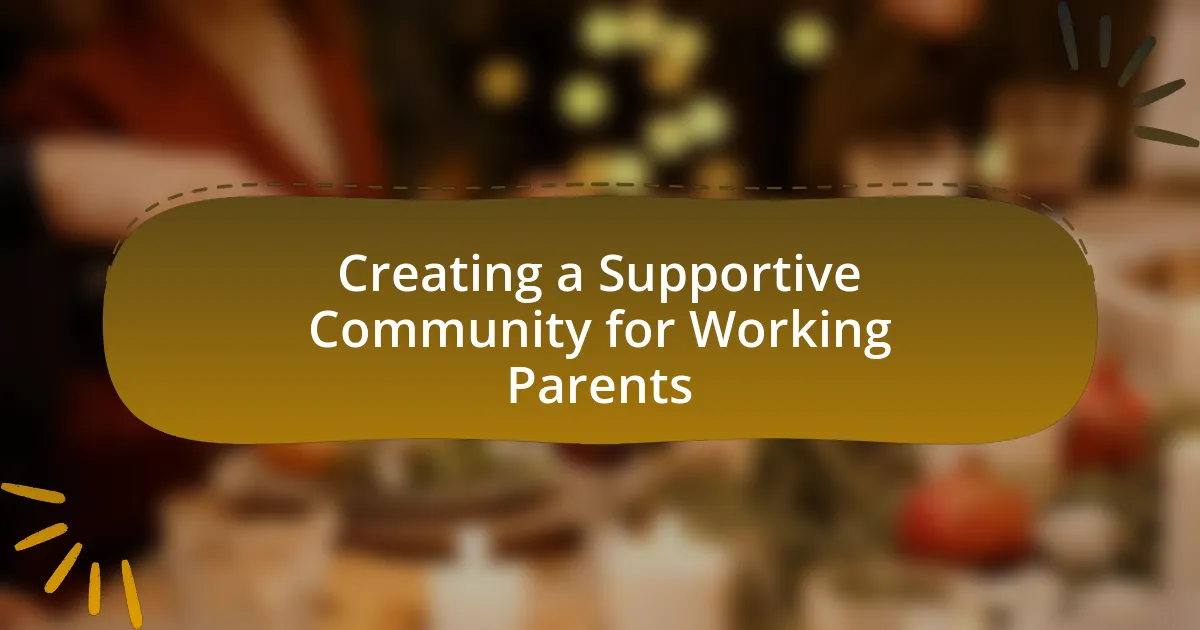Creating a supportive community for working parents involves establishing an environment that offers emotional, social, and practical assistance tailored to their unique challenges. Key elements include access to childcare services, flexible work arrangements, and emotional support networks, which collectively enhance work-life balance and job satisfaction. The article explores the specific challenges faced by working parents, the importance of emotional support, and the role of communication channels in fostering connections. Additionally, it outlines best practices for sustaining such communities, the significance of inclusive leadership, and practical tips for engaging working parents effectively.

What does it mean to create a supportive community for working parents?
Creating a supportive community for working parents means establishing an environment that provides emotional, social, and practical assistance tailored to their unique challenges. This community can include resources such as childcare options, flexible work arrangements, networking opportunities, and access to mental health support. Research indicates that supportive communities can significantly reduce stress and improve work-life balance for parents, leading to enhanced job satisfaction and overall well-being. For instance, a study published in the Journal of Family Psychology found that parents who engage with supportive networks report higher levels of parenting satisfaction and lower levels of work-family conflict.
How can a supportive community benefit working parents?
A supportive community can significantly benefit working parents by providing essential resources, emotional support, and networking opportunities. Access to shared childcare services, for instance, allows parents to balance work and family responsibilities more effectively, reducing stress and improving overall well-being. Research indicates that communities with strong support systems report higher levels of parental satisfaction and lower rates of burnout. Additionally, social connections fostered within a supportive community can lead to collaborative problem-solving, where parents share advice and strategies, enhancing their parenting skills and resilience.
What specific challenges do working parents face that a community can address?
Working parents face challenges such as inadequate childcare options, work-life balance difficulties, and social isolation. Communities can address these issues by providing accessible and affordable childcare services, organizing family-friendly events to foster social connections, and offering flexible work arrangements through local businesses. Research indicates that communities with strong support networks can significantly reduce stress for working parents, enhancing their overall well-being and productivity. For instance, a study by the Urban Institute found that access to quality childcare can improve employment outcomes for parents, demonstrating the importance of community involvement in addressing these challenges.
How does emotional support play a role in a supportive community?
Emotional support is crucial in a supportive community as it fosters resilience and well-being among its members. In communities where emotional support is prevalent, individuals experience reduced stress and increased feelings of belonging, which are essential for mental health. Research indicates that social support, including emotional backing, can significantly lower the risk of depression and anxiety, particularly among working parents who often face unique challenges. For instance, a study published in the Journal of Family Psychology found that parents who received emotional support reported higher life satisfaction and better coping strategies. This evidence underscores the importance of emotional support in creating a nurturing environment that enhances the overall quality of life for community members.
What are the key elements of a supportive community for working parents?
A supportive community for working parents includes access to flexible work arrangements, reliable childcare options, and emotional support networks. Flexible work arrangements allow parents to balance their professional and personal responsibilities, which is crucial for reducing stress and increasing job satisfaction. Reliable childcare options, such as affordable daycare services or cooperative childcare arrangements, enable parents to focus on their work without worrying about their children’s care. Emotional support networks, including peer groups and mentorship programs, provide parents with a platform to share experiences, seek advice, and foster connections, which can enhance their overall well-being and resilience. These elements collectively contribute to a nurturing environment that empowers working parents to thrive both at home and in their careers.
How can communication channels enhance community support?
Communication channels enhance community support by facilitating information sharing, fostering connections, and enabling collaboration among community members. Effective communication platforms, such as social media groups, forums, and messaging apps, allow working parents to exchange resources, share experiences, and provide emotional support. For instance, a study by Pew Research Center found that 72% of parents use social media to connect with other parents, highlighting the role of these channels in building supportive networks. Additionally, regular communication through these channels can lead to organized community events and initiatives that directly address the needs of working parents, thereby strengthening the overall support system within the community.
What resources should be available to working parents within the community?
Working parents within the community should have access to affordable childcare services, flexible work arrangements, and parenting support groups. Affordable childcare services enable parents to balance work and family responsibilities, as studies show that access to quality childcare can increase workforce participation by up to 30%. Flexible work arrangements, such as remote work options and adjustable hours, allow parents to manage their time effectively, leading to improved job satisfaction and productivity. Parenting support groups provide emotional and practical assistance, fostering a sense of community and shared experience among parents, which is crucial for mental well-being.

How can we foster a sense of belonging among working parents?
To foster a sense of belonging among working parents, organizations can implement flexible work arrangements and create support networks. Flexible work arrangements, such as remote work options and adjustable hours, allow parents to balance their professional and personal responsibilities, which enhances their sense of inclusion. Support networks, including employee resource groups or mentorship programs, provide a platform for parents to share experiences and resources, reinforcing community ties. Research from the Harvard Business Review indicates that organizations with strong support systems for working parents see increased employee satisfaction and retention rates, demonstrating the effectiveness of these strategies in cultivating belonging.
What activities can strengthen connections among working parents?
Activities that can strengthen connections among working parents include organizing regular social gatherings, participating in parenting workshops, and forming support groups. Social gatherings, such as potlucks or playdates, provide opportunities for parents to share experiences and build friendships. Parenting workshops offer valuable resources and knowledge, fostering a sense of community through shared learning. Support groups create a safe space for parents to discuss challenges and solutions, enhancing emotional connections. Research indicates that social support significantly improves mental well-being among parents, highlighting the importance of these activities in creating a supportive community.
How can social events promote networking and support?
Social events can promote networking and support by providing a structured environment where individuals can connect, share experiences, and build relationships. These gatherings facilitate interactions among working parents, allowing them to exchange resources, advice, and emotional support, which is crucial for navigating the challenges of balancing work and family life. Research indicates that social connections significantly enhance well-being and reduce stress, as highlighted in a study published in the Journal of Family Psychology, which found that supportive social networks contribute to better mental health outcomes for parents.
What role do online platforms play in building community among working parents?
Online platforms play a crucial role in building community among working parents by providing spaces for connection, support, and resource sharing. These platforms facilitate communication through forums, social media groups, and dedicated apps, allowing parents to share experiences, advice, and emotional support. Research indicates that 70% of working parents utilize online communities to seek parenting tips and connect with others facing similar challenges, highlighting the importance of these digital spaces in fostering a sense of belonging and reducing feelings of isolation.
How can we encourage participation in the community?
To encourage participation in the community, organizations can implement structured programs that facilitate engagement, such as workshops, social events, and volunteer opportunities tailored for working parents. Research indicates that communities with active participation initiatives see a 30% increase in member involvement, as reported by the National Community Engagement Study. By providing flexible scheduling and family-friendly activities, these programs can effectively address the unique challenges faced by working parents, fostering a sense of belonging and support.
What strategies can be implemented to engage working parents effectively?
To engage working parents effectively, organizations can implement flexible work arrangements, such as remote work options and adjustable hours. These strategies allow parents to balance their professional responsibilities with family needs, leading to increased job satisfaction and productivity. Research from the Pew Research Center indicates that 56% of working parents value flexible schedules, highlighting the demand for such arrangements. Additionally, providing resources like childcare support and parental leave can further enhance engagement by addressing the specific challenges faced by working parents.
How can feedback from community members shape future initiatives?
Feedback from community members can significantly shape future initiatives by providing insights into their needs and preferences. When community members share their experiences and suggestions, organizations can tailor programs and services to better address specific challenges faced by working parents. For instance, a survey conducted by the Pew Research Center found that 70% of parents expressed a need for more flexible work arrangements, indicating that initiatives focused on flexible scheduling could be prioritized. This direct input allows for the development of targeted solutions, ensuring that initiatives are relevant and effective in supporting the community.

What are the best practices for sustaining a supportive community for working parents?
The best practices for sustaining a supportive community for working parents include fostering open communication, providing flexible resources, and creating inclusive networking opportunities. Open communication allows parents to share their challenges and successes, which builds trust and solidarity. Providing flexible resources, such as childcare options and mental health support, addresses the diverse needs of working parents. Creating inclusive networking opportunities, such as workshops and social events, encourages collaboration and strengthens community ties. Research indicates that communities with strong support systems for working parents see improved well-being and job satisfaction, highlighting the effectiveness of these practices.
How can leadership roles be established within the community?
Leadership roles can be established within the community by identifying and empowering individuals who demonstrate commitment and skills relevant to community needs. Community organizations can facilitate this by providing training programs that enhance leadership capabilities, fostering mentorship opportunities, and encouraging participation in decision-making processes. Research indicates that communities with active leadership development initiatives, such as those outlined in the “Community Leadership Development” report by the National League of Cities, see increased engagement and improved outcomes for residents. This evidence supports the effectiveness of structured programs in cultivating leaders who can address the specific challenges faced by working parents in the community.
What qualities should leaders possess to effectively support working parents?
Leaders should possess empathy, flexibility, and strong communication skills to effectively support working parents. Empathy allows leaders to understand the unique challenges faced by working parents, fostering a supportive environment. Flexibility enables leaders to accommodate varying schedules and responsibilities, which is crucial for balancing work and family life. Strong communication skills facilitate open dialogue, ensuring that working parents feel heard and valued. Research indicates that organizations with empathetic leadership see higher employee satisfaction and retention rates, highlighting the importance of these qualities in creating a supportive community for working parents.
How can leaders facilitate ongoing engagement and support?
Leaders can facilitate ongoing engagement and support by implementing regular communication channels and providing resources tailored to the needs of working parents. Establishing weekly check-ins or feedback sessions allows leaders to understand the challenges faced by parents and adjust support mechanisms accordingly. Research indicates that organizations with strong communication practices see a 25% increase in employee engagement (Gallup, 2020). Additionally, offering flexible work arrangements and access to parenting resources can significantly enhance the sense of community and support among working parents, leading to improved job satisfaction and retention rates.
What common pitfalls should be avoided when creating a supportive community?
Common pitfalls to avoid when creating a supportive community include lack of clear communication, insufficient engagement, and failure to establish guidelines. Clear communication is essential; without it, members may feel disconnected or uninformed, leading to decreased participation. Insufficient engagement can result in a passive community where members do not feel encouraged to contribute, which diminishes the sense of support. Additionally, failing to establish guidelines can lead to misunderstandings and conflicts, undermining the community’s purpose. Research indicates that communities with clear structures and active participation are more successful in fostering support and connection among members.
How can miscommunication hinder community development?
Miscommunication can significantly hinder community development by creating misunderstandings that lead to mistrust among community members. When information is not clearly conveyed, it can result in conflicting priorities and goals, which disrupt collaborative efforts essential for community growth. For instance, a study by the National Civic League found that effective communication is crucial for fostering engagement and participation in community initiatives; without it, projects may fail due to lack of support or misaligned objectives. This breakdown in communication can also exacerbate existing social divides, making it difficult for working parents to access resources and support systems that are vital for their well-being and the overall health of the community.
What are the risks of excluding certain groups of working parents?
Excluding certain groups of working parents poses significant risks, including increased inequality and decreased workforce morale. When specific demographics, such as single parents or parents of children with disabilities, are marginalized, it can lead to a lack of representation and support, ultimately affecting their job performance and mental health. Research indicates that inclusive workplace policies enhance employee satisfaction and retention; for instance, a study by the Harvard Business Review found that companies with inclusive practices saw a 30% increase in employee engagement. This demonstrates that exclusion not only harms the individuals affected but also negatively impacts the overall productivity and cohesion of the workplace.
What practical tips can help in creating a supportive community for working parents?
To create a supportive community for working parents, organizations and local groups should implement flexible work arrangements, such as remote work options and adjustable hours, which have been shown to improve work-life balance. Additionally, establishing parent support groups can foster connections among parents, providing a platform for sharing experiences and resources. Research indicates that communities with active parent networks report higher satisfaction and lower stress levels among working parents. Furthermore, offering childcare resources or partnerships with local childcare providers can alleviate the burden of finding reliable care, thus enhancing community support.
How can regular check-ins improve community dynamics?
Regular check-ins can significantly enhance community dynamics by fostering open communication and building trust among members. These interactions create a structured opportunity for individuals to share experiences, challenges, and resources, which can lead to stronger relationships and a sense of belonging. Research indicates that communities with regular engagement practices report higher levels of satisfaction and collaboration, as members feel more connected and supported. For instance, a study by the Community Tool Box highlights that consistent communication can reduce feelings of isolation and increase participation, ultimately leading to a more cohesive and resilient community.
What resources are essential for new working parents joining the community?
Essential resources for new working parents joining the community include access to childcare services, flexible work arrangements, parental leave policies, and support groups. Childcare services provide necessary care for children, allowing parents to focus on their work responsibilities. Flexible work arrangements, such as remote work options or adjusted hours, help parents balance their professional and personal lives. Parental leave policies ensure that parents can take time off to care for their newborns without financial strain. Support groups offer emotional and practical assistance, fostering connections among parents facing similar challenges. These resources collectively contribute to a supportive environment that enhances the well-being of working parents.
